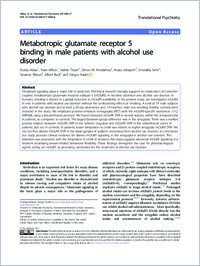Metabotropic glutamate receptor 5 binding in male patients with alcohol use disorder
DOKPE
- Akkus, Funda University of Bern, Switzerland
- Mihov, Yoan University of Bern, Switzerland
- Treyer, Valerie University Hospital Zurich, Switzerland
- Ametamey, Simon M. ETH Zurich, Switzerland
- Johayem, Anass University Hospital Zurich, Switzerland
- Senn, Smeralda Addiction Treatment Center, Ellikon an der Thur, Switzerland
- Rösner, Susanne Addiction Treatment Center, Ellikon an der Thur, Switzerland
- Buck, Alfred University Hospital Zurich, Switzerland
- Hasler, Gregor ORCID University of Bern, Switzerland ; [University of Fribourg]
- 2018
Published in:
- Translational Psychiatry. - Heidelberg : Springer Nature. - 2018, vol. 8, p. 1-8
English
Glutamate signaling plays a major role in addiction. Preclinical research strongly suggests an implication of G-protein-coupled metabotropic glutamate receptor subtype 5 (mGluR5) in nicotine addiction and alcohol use disorder. In humans, smoking is related to a global reduction in mGluR5 availability. In the present study, we investigated mGluR5 in vivo in patients with alcohol use disorder without the confounding effects of smoking. A total of 14 male subjects with alcohol use disorder and at least a 25-day abstinence and 14 matched male non-smoking healthy controls were included in the study. We employed positron emission tomography (PET) with the mGluR5-specific radiotracer [11C]ABP688, using a bolus/infusion protocol. We found increased mGluR5 DVR in several regions within the temporal lobe in patients, as compared to controls. The largest between-group difference was in the amygdala. There was a marked positive relation between mGluR5 DVR in the anterior cingulate and mGluR5 DVR in the orbitofrontal cortex in patients, but not in controls. In patients, lower temptation to drink was related to higher amygdala mGluR5 DVR. We did not find altered mGluR5 DVR in the basal ganglia of subjects recovering from alcohol use disorder. In conclusion, our study provides clinical evidence for altered mGluR5 signaling in the amygdala in alcohol use disorder. This alteration was associated with the temptation to drink. In addition, this study suggests abnormal mGluR5 signaling in a network underlying reward-related behavioral flexibility. These findings strengthen the case for pharmacological agents acting on mGluR5 as promising candidates for the treatment of alcohol use disorder.
- Faculty
- Faculté des sciences et de médecine
- Department
- Master en médecine
- Language
-
- English
- Classification
- Pathology, clinical medicine
- License
- CC BY
- Open access status
- gold
- Identifiers
-
- DOI 10.1038/s41398-017-0066-6
- ISSN 2158-3188
- Persistent URL
- https://folia.unifr.ch/unifr/documents/327691
Statistics
Document views: 29
File downloads:
- akkusetal.2018.pdf: 65
